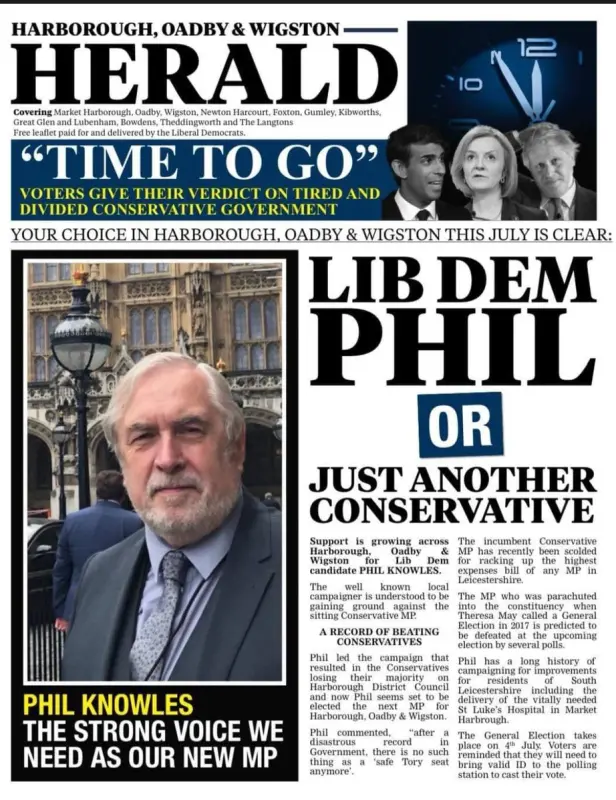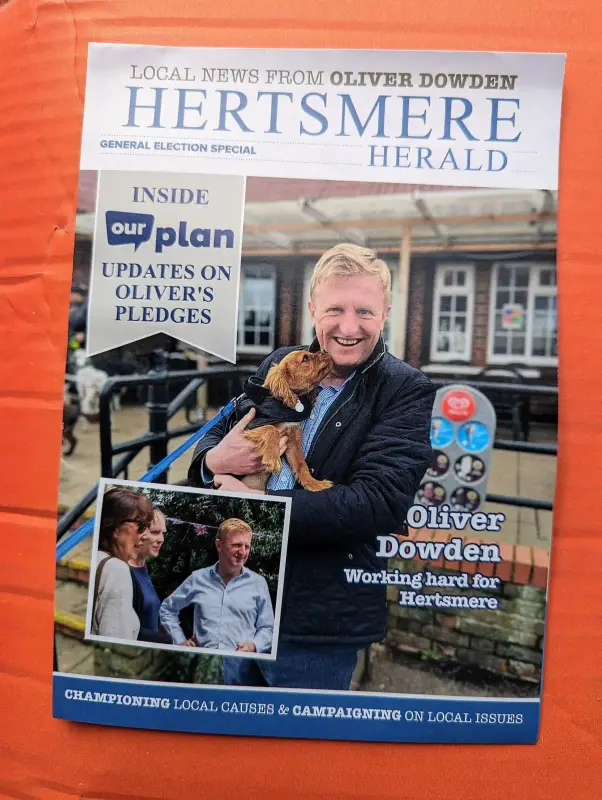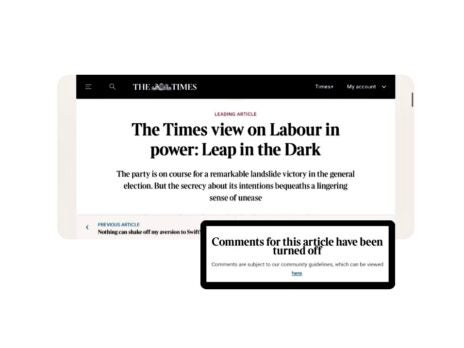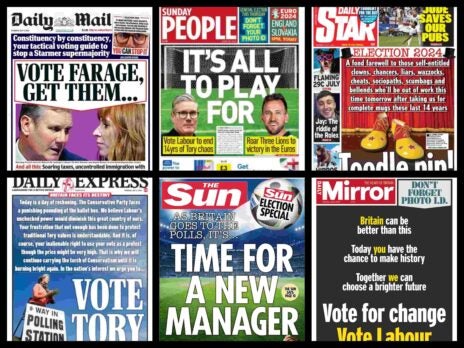
The Conservatives and Liberal Democrats have continued to distribute fake local newspapers promoting their candidates in the 2024 general election, despite criticism of the practice from media groups and journalists.
While the Conservative Party ignored a Press Gazette request for comment about, the Liberal Democrats defended it, arguing the literature is “clearly identified” and that it is “effective way of communicating with people”.
What fake newspapers have been sent in the 2024 election?
Press Gazette has been sent or found on social media 14 examples of fake newspapers sent during the election campaign: nine were sent by the Liberal Democrats, four by the Conservatives and one by the Green Party. Press Gazette has not yet seen examples sent by Labour.
The Liberal Democrat examples all used newspaper-style names, for example the “Tunbridge Wells Telegraph”, the “West Dorset Courier”, the “North East Fife Gazette” or the “Harborough, Oadby & Wigston Herald”.

The papers all disclose under the masthead that they are “paid for and delivered by the Liberal Democrats”.
There has been more variety in Conservative news-style election literature. Some, for example the advert below that was distributed for Deputy Prime Minister Oliver Dowden, ape the appearance of a magazine under a newspaper-style masthead. In Dowden’s case, the front cover does not explicitly disclose a connection to the Tories, but is open that it provides “news from Oliver Dowden”.

In other cases, for example this leaflet sent by Conservative Minister Esther McVey, the literature resembles a newspaper but under a more political title, for example “Securing our future in Tatton” or simply “Your Future“. McVey’s newspaper discloses under the title that it is from “your local Conservative candidate”, and the “Your Future” leaflet, which appears to have been sent out in more than one constituency, carries a Conservative logo.
The Green paper, which was distributed in Bristol Central where party co-leader Carla Denyer is hoping to unseat Labour incumbent Thangam Debbonaire, ran under the masthead “Election News Bristol Central” with a subhead reading: “Free newspaper delivered by local residents for Bristol Green Party”.
List of 2024 general election fake newspapers found by Press Gazette to date:
- “Tunbridge Wells Telegraph”, Liberal Democrats, 30 June
- “News Gazette”, Epsom and Ewell, Liberal Democrats, 29 June
- “West Dorset Courier”, Liberal Democrats, 27 June
- “North East Fife Gazette”, Liberal Democrats, 27 June
- “Harpenden and Berkhamsted Gazette”, Liberal Democrats, 24 June
- “Bicester & Woodstock Observer”, Liberal Democrats, 22 June
- “Harborough, Oadby & Wigston Herald”, Liberal Democrats, 19 June
- “Stratford-on-Avon Chronicle”, Liberal Democrats, 26 June
- “Witney & Western Vale Observer”, Liberal Democrats, 11 June
- “Hertsmere Herald”, Conservatives, 1 July (via email, see above)
- “Your Future”, Huntingdon, Conservatives, 4 June
- “Securing Our Future in Tatton”, Conservatives, 26 June
- “Your Future”, Forest of Dean, Conservatives, 5 June
- “Election News Bristol Central”, Green, 1 July.
- Woking Gazette and Woking Herald, Liberal Democrats, 3 July
In Woking the Lib Dems can’t decide if their fake local paper is the Woking Herald or the Woking Gazette. pic.twitter.com/fqilOsGsxZ
— Andrew Penman (@PenmanJourno) July 3, 2024
‘It reduces the integrity of our democratic system’
Amid the well-documented decline of local newspapers, the choice by political parties to dress election literature as though it were news has irked some journalists in recent years.
Pulman’s Weekly News publisher Duncan Williams told Press Gazette that a case like Dowden’s Hertsmere Herald “needs calling out when even Deputy Prime Minister does it… this publication is a real slap in the face”.
“It seems that, right up to their swan song, the Conservative government has done nothing practical during their time in office to actually support the struggling local news industry, only embracing actions that harm regional news credibility.”
In January the Society of Editors called for the practice of parties printing election newspapers to end, arguing it “damage[s] democracy and undermine[s] public trust in both politics and the news media”.
A petition launched this year by fact-checkers Full Fact calling for an end to “deceptive campaign practices” — including both fake newspapers and ads that look like polling cards or final notices — received 17,730 signatures and was sent to the leaders of all the major parties.
Press regulator Impress has also hit out at the ads, saying last year that “it is essential that the public are able to trust what they read… misleading the public with fake newspapers will only damage that trust”. Press Gazette itself called for an end to the practice of fake election newspapers in 2019.
And in 2020, after feedback from voters, the Electoral Commission warned that parties “need to take greater responsibility for the presentation and content of campaigns they run and the impact of their activities on public confidence in elections”.
(Asked about the matter this week the Electoral Commission told Press Gazette fake newspapers had not been raised as “a major issue” by voters at this election.)
Dr Colin Alexander, a senior lecturer in political communications at Nottingham Trent University, told Press Gazette this week the materials were “worrying because they are attempting to impersonate journalism, which, for many people, exists within a professional code of truth, impartiality and holding the powerful to account”.
Alexander, who lives in the Sheffield Hallam constituency formerly represented by Lib Dem leader Nick Clegg, said he had himself received several of the party’s tabloids.
“For [the candidate’s] team to engage in such a deceptive communications strategy is a strong signifier of a lack of respect for voters,” he said. “It reduces the integrity of our democratic system and is indifferent to journalism’s role in helping to develop citizenship and raise public consciousness.”
Not all journalists are concerned about the fake papers, however. The Daily Express’ senior political correspondent Christian Calgie wrote on X last week: “Voters are actually intelligent enough to see this is a party leaflet, all parties do it, we don’t need faux shock and outrage about this every fortnight during an election.”
Liberal Democrats: ‘Tabloid newspapers are an effective way of communicating’
Earlier this year the Liberal Democrats published a page on its website acknowledging the criticisms, but defending the practice in principle.
The party wrote: “Tabloid newspapers are an effective way of communicating with people and have been used by all political parties for decades… different people take in information in different formats, tabloids often reach people that different designs don’t.
“In many parts of the country, the Lib Dem tabloid format is a well-established and trusted local brand in its own right.”
The defence was coupled with new guidelines to local Liberal Democrats requiring them to use centrally-produced templates that “are clearly identifiable as being from and paid for by the Liberal Democrats on the front page”.
Local branches were also instructed to “avoid giving tabloids titles that could be confused with any similar local newspapers”.
A spokesperson for the party told Press Gazette: “This goes further than political parties’ legal requirements which only state that a tiny imprint is needed. It’s crucial that this campaigning literature states clearly it comes from a political party.
“The Lib Dems are the only party with a clear plan to save and protect local journalism from the existential threat they face from big tech companies, social media and the shift towards online news.
“We’re calling for a levy on very large social media companies to provide financial support for local journalism. We have a duty to lead by example and promote a diverse and high-quality news ecosystem.”
In its manifesto the Liberal Democrat party said it wanted to increase the Digital Services Tax on large tech companies from 2% to 6%, although it did not specify what that tax revenue would be used for.
The party said on its page defending “tabloid” election literature that it also supports requiring big tech to remunerate the news industry (something that has since been passed into law in the Digital Markets, Consumers and Competition Act).
After Press Gazette published this article Buddy Anderson, a councillor for the Liberal Democrats in Harborough, Leicestershire, saying: “I think we need to take on board the electorate’s feedback on this and stop the mock newspapers moving forward.
“It’s really important that politics is transparent, and that any promotional material we sent out is not misleading voters into thinking it’s something that it isn’t.
“I have made the local party leadership aware I am opposed to us doing another newspaper in the future, as I value the feedback the residents have given on this.”
Email pged@pressgazette.co.uk to point out mistakes, provide story tips or send in a letter for publication on our "Letters Page" blog







